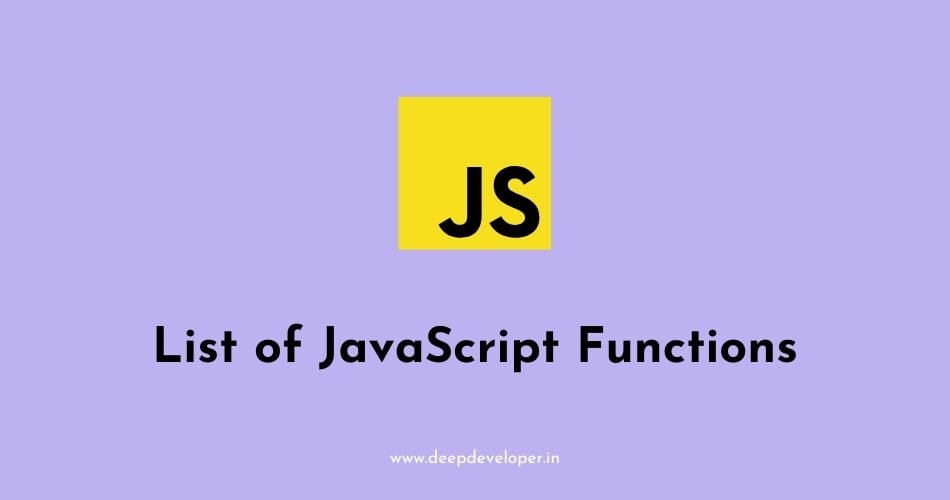JavaScript has a wide range of built-in functions that can be used for various purposes. Here is a list of JavaScript functions:
- alert() – displays an alert box with a message
- console.log() – writes a message to the browser’s console
- prompt() – displays a dialog box for the user to input a value
- parseInt() – converts a string to an integer
- parseFloat() – converts a string to a floating-point number
- isNaN() – checks if a value is not a number
- String() – converts a value to a string
- Number() – converts a value to a number
- Boolean() – converts a value to a boolean
- typeof() – returns the type of a value
- Math.random() – returns a random number between 0 and 1
- Math.floor() – rounds a number down to the nearest integer
- Math.ceil() – rounds a number up to the nearest integer
- Math.round() – rounds a number to the nearest integer
- Math.max() – returns the largest of zero or more numbers
- Math.min() – returns the smallest of zero or more numbers
- Math.abs() – returns the absolute value of a number
- Math.sqrt() – returns the square root of a number
- Date() – returns the current date and time
- setTimeout() – sets a timer to execute a function after a specified time
- setInterval() – sets a timer to execute a function repeatedly after a specified time
- clearTimeout() – cancels a timeout set with setTimeout()
- clearInterval() – cancels an interval set with setInterval()
- encodeURI() – encodes a URI
- decodeURI() – decodes a URI
This list is not exhaustive, JavaScript has many more built-in functions and also you can create your own functions as well.
Some Additional JavaScript Functions
Here are some additional JavaScript functions that are commonly used:
- Array.prototype.push() – adds an element to the end of an array
- Array.prototype.pop() – removes the last element from an array
- Array.prototype.shift() – removes the first element from an array
- Array.prototype.unshift() – adds an element to the beginning of an array
- Array.prototype.slice() – returns a new array with a subset of the elements of an array
- Array.prototype.splice() – adds or removes elements from an array
- Array.prototype.sort() – sorts the elements of an array
- Array.prototype.filter() – creates a new array with all elements that pass a certain test
- Array.prototype.map() – creates a new array with the results of calling a provided function on every element in the array
- Array.prototype.forEach() – calls a function once for each element in an array
- Array.prototype.reduce() – applies a function against an accumulator and each element in the array to reduce it to a single value
- Array.prototype.concat() – returns a new array that concatenates two or more arrays
- Array.prototype.indexOf() – returns the first index at which a given element can be found in the array, or -1 if it is not present
- Array.prototype.lastIndexOf() – returns the last index at which a given element can be found in the array, or -1 if it is not present
- String.prototype.length – returns the length of a string
- String.prototype.concat() – concatenates two or more strings
- String.prototype.toUpperCase() – converts a string to uppercase
- String.prototype.toLowerCase() – converts a string to lowercase
- String.prototype.substring() – returns a subset of a string
- String.prototype.split() – splits a string into an array of substrings
- String.prototype.replace() – replaces a substring with another string
- String.prototype.search() – searches for a substring in a string and returns its position
- String.prototype.match() – searches for a match between a regular expression and a string
- String.prototype.trim() – removes whitespace from the beginning and end of a string
- JSON.stringify() – converts a JavaScript object to a JSON string
- JSON.parse() – converts a JSON string to a JavaScript object
- Object.keys() – returns an array of the keys of an object
- Object.values() – returns an array of the values of an object
- Object.entries() – returns an array of the key-value pairs of an object
- Object.assign() – copies the values of all enumerable own properties from one or more source objects to a target object
Also Read:
- How To Get The Last Character Of A String In JavaScript
- Remove The Last Character Of A String In JavaScript
- How To Validate An Email Address In JavaScript
- How To Check If An Input Field Is Empty In JavaScript
- Check If An Input Field Is A Number In JavaScript
- Confirm Password Validation In JavaScript
- How To Print A PDF File Using JavaScript
- Calculate The Number Of Days Between Two Dates In JavaScript
- How To Compare Two Dates In JavaScript
- Calculate Age With Birth Date YYYYMMDD In JavaScript
- How To Append or Add Text To A DIV Using JavaScript
- How To Get The Text Of HTML Element In JavaScript
- How To Change The Text Inside A DIV Element In JavaScript
- Show/Hide Multiple DIVs In JavaScript
- Show A DIV After X Seconds In JavaScript
- Display A JavaScript Variable In An HTML Page
- How To Generate A Random Number In JavaScript
- Bubble Sort In JavaScript
- Insertion Sort In JavaScript
- Selection Sort In JavaScript
- How To Remove A Specific Item From An Array In JavaScript
- Merge Sort In JavaScript
- Round To 2 Decimal Places In JavaScript
- SetInterval() and setTimeout() Methods In JavaScript
- Generate A Unique ID In JavaScript
- Caesar Cipher In JavaScript
- How To Reverse A String In JavaScript
- How To Loop Through A Plain JavaScript Object
- How To Open A URL In A New Tab Using JavaScript?

